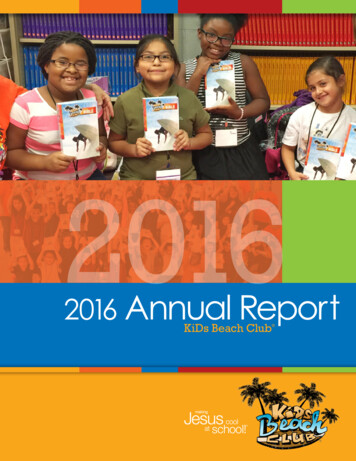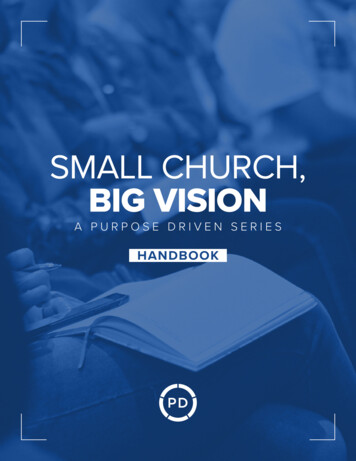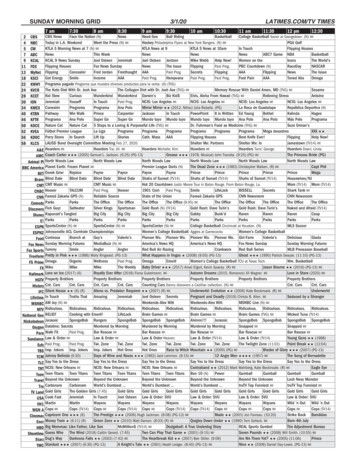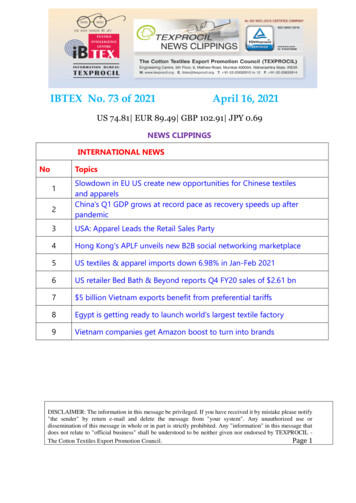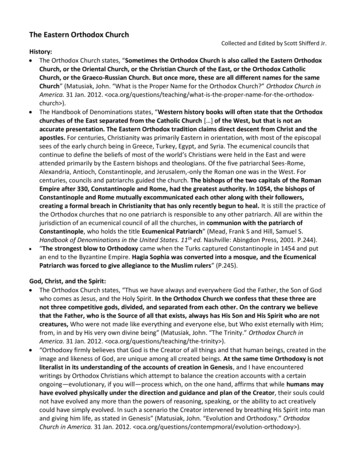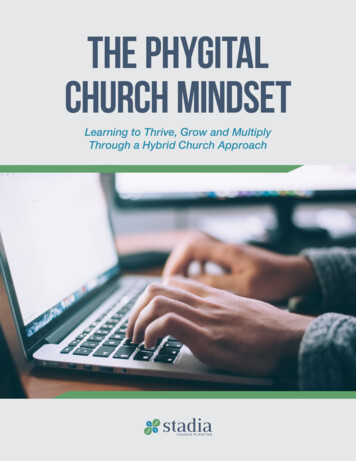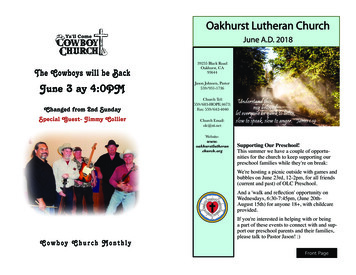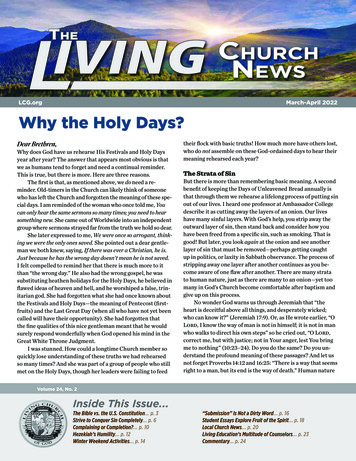
Transcription
TheChurchNewsLCG.orgMarch-April 2022Why the Holy Days?Dear Brethren,Why does God have us rehearse His Festivals and Holy Daysyear after year? The answer that appears most obvious is thatwe as humans tend to forget and need a continual reminder.This is true, but there is more. Here are three reasons.The first is that, as mentioned above, we do need a reminder. Old-timers in the Church can likely think of someonewho has left the Church and forgotten the meaning of these special days. I am reminded of the woman who once told me, Youcan only hear the same sermons so many times; you need to hearsomething new. She came out of Worldwide into an independentgroup where sermons strayed far from the truth we hold so dear.She later expressed to me, We were once so arrogant, thinking we were the only ones saved. She pointed out a dear gentleman we both knew, saying, If there was ever a Christian, he is.Just because he has the wrong day doesn’t mean he is not saved.I felt compelled to remind her that there is much more to itthan “the wrong day.” He also had the wrong gospel, he wassubstituting heathen holidays for the Holy Days, he believed inflawed ideas of heaven and hell, and he worshiped a false, trinitarian god. She had forgotten what she had once known aboutthe Festivals and Holy Days—the meaning of Pentecost (firstfruits) and the Last Great Day (when all who have not yet beencalled will have their opportunity). She had forgotten thatthe fine qualities of this nice gentleman meant that he wouldsurely respond wonderfully when God opened his mind in theGreat White Throne Judgment.I was stunned. How could a longtime Church member soquickly lose understanding of these truths we had rehearsedso many times? And she was part of a group of people who stillmet on the Holy Days, though her leaders were failing to feedtheir flock with basic truths! How much more have others lost,who do not assemble on these God-ordained days to hear theirmeaning rehearsed each year?The Strata of SinBut there is more than remembering basic meaning. A secondbenefit of keeping the Days of Unleavened Bread annually isthat through them we rehearse a lifelong process of putting sinout of our lives. I heard one professor at Ambassador Collegedescribe it as cutting away the layers of an onion. Our liveshave many sinful layers. With God’s help, you strip away theoutward layer of sin, then stand back and consider how youhave been freed from a specific sin, such as smoking. That isgood! But later, you look again at the onion and see anotherlayer of sin that must be removed—perhaps getting caughtup in politics, or laxity in Sabbath observance. The process ofstripping away one layer after another continues as you become aware of one flaw after another. There are many stratato human nature, just as there are many to an onion—yet toomany in God’s Church become comfortable after baptism andgive up on this process.No wonder God warns us through Jeremiah that “theheart is deceitful above all things, and desperately wicked;who can know it?” (Jeremiah 17:9). Or, as He wrote earlier, “OLord, I know the way of man is not in himself; it is not in manwho walks to direct his own steps” so he cried out, “O Lord,correct me, but with justice; not in Your anger, lest You bringme to nothing” (10:23–24). Do you do the same? Do you understand the profound meaning of these passages? And let usnot forget Proverbs 14:12 and 16:25: “There is a way that seemsright to a man, but its end is the way of death.” Human natureVolume 24, No. 2Inside This Issue.The Bible vs. the U.S. Constitution p. 3Strive to Conquer Sin Completely p. 6Complaining or Completion? p. 10Hezekiah’s Humility p. 12Winter Weekend Activities p. 14“Submission” Is Not a Dirty Word p. 16Student Essays Explore Fruit of the Spirit p. 18Local Church News p. 20Living Education’s Multitude of Counselors p. 23Commentary p. 24
Living Church NewsMarch-April 2022is easily deceived. Some “truths” about ourselves and ourcharacter—of which we are sure in our own thinking—are, infact, not true.When we prepared for baptism, the principles found inthese passages were points of focus for us. Many of us memorized them, recognizing their importance. But, as I wrote inour John 3:16 booklet, “The problem with memorization isthat, once we learn something, our brains stash it away andconcentrate on something new” (p. 41).So, we must never “stash away” the meaning of the Daysof Unleavened Bread. Rather, we must year-by-year peel awayone wrong action and way of thinking after another. Puttingaway sin does not end at baptism.Are You Desensitized?And there is a third valuable lesson for us. Our world is constantly blurring standards of right and wrong. What we onceconsidered wrong may not seem so wrong today. We growmore tolerant of sinful behaviors as we become desensitizedto the sin all around us.Hunter Madsen and Marshall Kirk explained desensitization in their book After the Ball: How America Will ConquerIts Fear and Hatred of Gays in the ’90s, outlining their plan toinfluence Americans to accept homosexuality. They explainedhow to use the media to make homosexuality appear a normalpart of society. Do you find yourself desensitized, even sidingwith behaviors contrary to the Scriptures? Do you encouragesinful behavior?This is what happened in Corinth with the man who wassleeping with his stepmother (1 Corinthians 5). Paul, decrying the Corinthians’ tolerance of sinful behavior, connects itdirectly to their forgetting the meaning of Christ’s sacrificeand the Days of Unleavened Bread. “Your glorying is notgood. Do you not know that a little leaven leavens the wholelump? Therefore purge out the old leaven, that you may be anew lump, since you truly are unleavened. For indeed Christ,our Passover, was sacrificed for us. Therefore let us keep thefeast, not with old leaven, nor with the leaven of malice andwickedness, but with the unleavened bread of sincerity andtruth” (vv. 6–8). We are equally guilty if we give a thumbs-upEditor in Chief:Editorial Director:Executive Editor:Managing Editor:Senior Editor:Regional Editors: Editorial Assistants: Asst. Copy Editors: Business Manager: 2Gerald E. WestonRichard F. AmesWallace G. SmithJohn RobinsonWilliam BowmerRobert Tyler (Australasia)Stuart Wachowicz (Canada)Peter G. Nathan (Europe and Africa)William Williams Thomas WhiteSandy Davis Linda Ehman Genie OgwynDexter B. Wakefieldon social media and tell someone how brave he or she is for“coming out of the closet.”The Bible calls Satan “the prince of the power of theair”—the one who directs “the course of this world” (Ephesians 2:2). The depth to which he directs the world is oftenunderestimated, as he uses the same devices repeatedly andwe grow desensitized to them. The same violence and sexualimmorality Satan inspired prior to the Flood and among thecities of the plains—including Sodom and Gomorrah—is playing out again in our world today. Corinth’s immorality can befound in our modern cities, and in all forms of modern media.How many are addicted to pornography, gory video games,gambling, fornication? These things may be accepted in ourgeneration, but God does not “cave” to the vote of man.Our constant desensitization toward ungodly valuesmeans that we must take stock each year and ask ourselves,What have I absorbed this year? How have my moral perceptions changed over the last five years? Do I tolerate any entertainment that I would have shunned ten years ago? These areserious questions for serious meditation!Paul admonishes us to “walk circumspectly, not as foolsbut as wise” (Ephesians 5:15). To be circumspect means tohave our eyes wide open to what is happening around us. Paultells us further,And do this, knowing the time, that now it is hightime to awake out of sleep; for now our salvation isnearer than when we first believed. The night is farspent, the day is at hand. Therefore let us cast offthe works of darkness, and let us put on the armor oflight. Let us walk properly, as in the day, not in revelry and drunkenness, not in lewdness and lust, notin strife and envy. But put on the Lord Jesus Christ,and make no provision for the flesh, to fulfill its lusts(Romans 13:11–14).What do you need to change this year?The Living Church News is published bimonthly by the Living Church of God, 2301 Crown Centre Drive,Charlotte, NC 28227. Subscriptions are sent without charge to members of the Living Church of God. 2022 Living Church of God . Printed in the USA. All rights reserved. Postage paid at Charlotte, NC.Postmaster: Send address changes toThe Living Church News P.O. Box 3810 Charlotte, NC 28227The Living Church of God is not responsible for the return of unsolicited articles and photographs.Scriptures are quoted from the New King James Version ( Thomas Nelson, Inc., Publishers) unlessotherwise noted.Image(s) used under license from Shutterstock.com
By Gerald E. WestonThe Bible vs. the U.S. ConstitutionOne of our ministers was challenged, “Can youshow me even one example where the U.S.Constitution is in disagreement with theBible?” This question demonstrates a profound lack of understanding of the Gospel message andpossibly ignorance as to what is in the Constitution. Thequestioner was immersed in all the political wranglinggoing on in America today, and his approach expressedthe attitude, I have my God-ordained rights; no one is goingto tell me what to do.We should all be thankful for the liberties we havein the U.S. and other Israelite countries. The U.S. Constitution provides for checks and balances as safeguardsagainst tyranny. The founders understood the selfishtendency of human nature and what can happen whencarnal men have too much power. They therefore set upwhat was intended to be a fair—but, in some ways, deliberately inefficient—system, not allowing any single statetoo much power. That is why each state, no matter its size,has two senators but varying numbers of Congressmen inthe House of Representatives based on population.The American founders also enshrined certain individual rights that could not be taken away by majorityopinion, and they set up a judicial system to uphold theserights. That is how it is supposed to work—but, as weknow, selfish individuals often find ways to get around orignore laws. Nevertheless, it would be impossible for usto carry on this Work without such freedoms as those ofspeech, religion, and expression. This is especially so because the truth is not a majority creed.Every U.S. citizen—and even citizens of other nations—should be thankful for the freedoms enshrinedin the U.S. Constitution, as those freedoms have de factospread far beyond national borders and created a basefrom which God’s Church can preach the truth around theworld. But does that mean the U.S. Constitution agreeswith the Bible? Will it be the founding document underthe rule of Christ—and, if not, what will be the foundingdocuments of Jesus’ worldwide rule?Sadly, many are ignorant of the document in whichthey profess to have such faith, and they often conflatethree different documents. As one can easily find online,“The Declaration [of Independence], the Constitution,and the Bill of Rights are, in many ways, fused together inthe minds of Americans” (ConstitutionCenter.org).The Declaration of IndependenceThe Declaration of Independence was drafted in 1776and, among other points, gives us these memorablewords: “We hold these truths to be self-evident, that allmen are created equal, that they are endowed by theirCreator with certain unalienable Rights, that amongthese are Life, Liberty and the pursuit of Happiness.”These words and phrases certainly sound good, butwhat about the following words found in the Declaration? “To secure these rights, Governments are institutedamong Men, deriving their just powers from the consentof the governed.” Does this statement not go back to theGarden of Eden, where man took to himself the prerogative to choose right and wrong? Will the rule of Christ bederived from “the consent of the governed”? Or will it bederived from the decree of God Almighty?The Declaration continues, “Whenever any Form ofGovernment becomes destructive of these ends, it is theRight of the People to alter or to abolish it, and to institute new Government, laying its foundation on such principles and organizing its powers in such form, as to themshall seem most likely to effect their Safety and Happiness.” In other words, it is the “Right of the People” tooverthrow a government they deem unjust—exactly whatwas done by the American Revolution, and why this document is called a declaration of “Independence.” America’s founding fathers wanted to be independent from theking of England. One can certainly argue that this was agood choice, but—more than most people realize—it nodoubt had more to do with God’s plan to separate twobrothers, similar to what happened to Israel at the time ofJeroboam and Rehoboam, when God said the separationthat created two nations, Judah and Israel, “is from Me”(1 Kings 12:24).The question must be asked: Should a true followerof Christ take up weapons to overthrow the government he is under? What did Jesus say? “My kingdomis not of this world. If My kingdom were of this world,My servants would fight but now My kingdom is notfrom here” (John 18:36). When Jesus was taken intocustody—ultimately to be martyred—Peter whipped outa sword and took off a man’s ear (John 18:10–11). DidJesus commend Peter for his zeal? To the contrary—Herebuked him for attempting to thwart God’s greaterplan. Matthew’s account of the incident adds, “But Jesus3
Living Church Newssaid to him, ‘Put your sword in its place, for all who take thesword will perish by the sword’” (Matthew 26:52). Later, theApostle Paul explains that our citizenship is in heaven (Philippians 3:20).The U.S. ConstitutionThe U.S. Constitution was drafted eleven years after theDeclaration, when the Revolutionary War was over. Again,we see a focus on human rule from the bottom up, as its preamble begins: “We the people. ” There are seven articles inthe Constitution, each focusing on setting up a humanly devised form of government. Article 1 establishes a Congress—the House of Representatives and the Senate. Article 2establishes the executive—a president. Article 3 establishesa Judiciary—the Supreme Court and lower courts. Article4 defines relationships among the states. Article 5 detailshow amendments may be made. Article 6 addresses debtsand treaties. Finally, Article 7 contains the ratification of thedocument.As we see, this describes a form of government nowhere found in Scripture. So, we must ask, No matter howmuch we may be enamored with it, is the U.S. Constitution inagreement with the Bible? Does God want “we the people”choosing our leaders? (We might also ask, How are we doingon that score? ) Is the Constitution merely the foundationof one more humanly constructed rule of law that is in theprocess of failing, as have all the others? In many respectsit has served exceptionally well for more than 235 years,but its days were numbered from the beginning. It will fail,thanks to human greed, selfishness, and sin. No, this is notthe Kingdom of God!March-April 2022free exercise thereof.” We are thankful for that amendment,as without it the truth would be suppressed quickly by astate-sponsored counterfeit Christianity, as it was in Englandand Europe. But does freedom of religion reflect the Bible, themind of God?Let us not forget the question sparking this article: Arethe U.S. Constitution and the Bible in harmony? Well, doesthe Bible support the First Amendment’s guarantee of freedom of religion? While we are thankful for the freedoms andrights we enjoy, the ultimate answer is absolutely not!Nowhere does the Bible speak kindly of other gods.“Hear, O My people, and I will admonish you! O Israel, if youwill listen to Me! There shall be no foreign god among you;nor shall you worship any foreign god. I am the Lord yourGod, who brought you out of the land of Egypt; open yourmouth wide, and I will fill it” (Psalm 81:8–10). Deuteronomy12:1–5 called for the destruction of pagan places of worship,and Leviticus 20 took it one step further, decreeing the deathpenalty for anyone promoting the foreign god Molech. Onemight wonder why a loving God would take this approach.The answer is simple: False religion does not reflect the mindof God and will ultimately supplant the true worship of God ifleft unchecked.Of course, we understand that we are not living in theOld Covenant nation of Israel. As such, individual Christiansmust not take it upon themselves to enact the death penaltyor to destroy the property of those with different beliefs. Butthe mind of God toward idolatry and false religions is clear.God also warns us against counterfeit Christianity in Matthew 24:4–5, 2 Corinthians 11:13–15, and Revelation 17–18,just to name a few of many instances. He condemns idolatryfrom Genesis to Revelation. There will be none ofany nation’s “freedom of worship” under the government of the only true God!The First Amendment continues, “Congressshall make no law respecting an establishment ofreligion, or prohibiting the free exercise thereof;or abridging the freedom of speech, or of thepress. ” We are thankful for freedom of speech.Without it, our speech would be censored, whichis even beginning to happen now, as America isstraying further and further from its foundingdocuments. But should there be limits to freespeech? If the U.S. were truly a godly nation, there would be.The Bible—yes, even one of the Ten Commandments—forbidsone kind of speech: “You shall not take the name of the Lordyour God in vain, for the Lord will not hold him guiltless whotakes His name in vain” (Exodus 20:7).This principle extends to how we speak about our rulers:“You shall not revile God, nor curse a ruler of your people”(Exodus 22:28). A powerful statement was made after a manWe are thankful for freedom of speech. Withoutit, our speech would be censored, which is evenbeginning to happen now that America is strayingfurther and further from its founding documents.But should there be limits to free speech? If theU.S. were truly a godly nation, there would be!The First AmendmentThe Bill of Rights was proposed in 1789 and comprises thefirst ten amendments to the Constitution—and it is whatmany people think of when they think of the Constitution.Because so much can be said about these amendments, thescope of this article only allows me to review the first two.The First Amendment says that “Congress shall make no lawrespecting an establishment of religion, or prohibiting the4
Living Church Newsblasphemed the name of God (Leviticus 24:11–16). The mindof God (v. 12) dictated that the man be put to death. Even so,we as Christians under the New Covenant are not responsiblefor punishing others. That is left for God to handle—and handle it He will, in His time!Has God changed His mind about freedom of speech? Notaccording to Malachi 3:6 and Hebrews 13:8. In a practical example of this, after the Apostle Paul spoke very sharply without realizing he was speaking to the High Priest (Acts 23:1–5),he acknowledged his error and quoted from the command inExodus 22:28 when he was informed of this fact.Another example of God’s mind involves how we speakof our parents: “For everyone who curses his father or hismother shall surely be put to death” (Leviticus 20:9). Onceagain, we are not under the theocracy of the Israelite nationadministered by Moses, and it is not our responsibility tocarry out the death penalty. But this passage shows us theMarch-April 2022A Future ConstitutionWhile we are grateful for the freedoms we have under the U.S.Constitution, the Canadian Charter of Rights and Freedoms,and any other humanly devised document that brings a levelof peace and religious freedom, none agree with the Bible. Wehave seen a few indisputable examples in this article. All suchdocuments contradict the Bible in numerous ways.Let us now turn to the question of what Constitution—what instrument of government—Christ will institute uponHis return. What will be the foundation and structure of Hisrule? The Bible answers this question. It tells us the formof government, how leaders of that government will be selected, the laws of that government, and how those laws willbe enforced.Instead of “We the people ” it will be “I am the Lordyour God, who brought you out of the land of Egypt, out of thehouse of bondage” (Exodus 20:2). Israel of old rejected God’srule (1 Samuel 8:7), but His rule will be reestablished—not only for Israel, but for the whole world(Zechariah 14:9). David will be resurrected to beking over all Israel (Jeremiah 30:9). The TwelveApostles will each rule over one of the twelvetribes of Israel (Matthew 19:28). We who respondduring this age to God’s calling will be given responsibility over cities (Luke 19:11–19). That is thepattern found in Scripture, but much detail will befilled in as Christ appoints rulers over nations, cities, and specific responsibilities within them.The Ten Commandments will be our Bill of Rights(Exodus 20:2–17), from which will come true liberation(James 1:25; 2:12). Freedom of speech and expression willcome with limits that reflect the mind of God—putting anend to disrespect, profanity, pornography, and pagan religious practices. God’s Spirit will undergird that new world(Hebrews 8:6–13). Children will honor their parents andthere will be respect for Christ’s chosen leaders. There willbe no more need for guns to fight wars or protect oneself(Isaiah 2:1–4). And when someone does stray too far offtrack, there will be reminders from caring Spirit rulers(Isaiah 30:20–21).That will be a very different world from the one in whichwe now live. We are told to come out of this present Babylonish world (Revelation 18:4). “And do not be conformed tothis world, but be transformed by the renewing of your mind,that you may prove what is that good and acceptable andperfect will of God” (Romans 12:2). Mankind’s Declarationsof Independence, Constitutions, and Bills of Rights are in disagreement with the Bible. How sad it is that members can bein God’s Church for decades and not realize this basic truth.Perhaps it is time to search more thoroughly for the leaventhat sits in the back of our minds! LNWe are not to speak evil of God, of our rulers, orof our parents. Brethren, there is much violationof this, even among members of God’s Church.We must take the mind of God seriously!mind of God toward the offender. We are not to speak evil ofGod, of our rulers, or of our parents. Brethren, there is muchviolation of this, even among members of God’s Church. Wemust take the mind of God seriously!Under the Constitution, all these examples of speechare protected—you can use God’s name in vain, you can sayanything vile against a ruler, and you can curse your parents!Returning to our central question of comparing the Bible andthe U.S. Constitution, we have seen that there is a clear dichotomy between the two governing documents.The Second AmendmentThe Second Amendment reads, “A well regulated Militia,being necessary to the security of a free State, the right ofthe people to keep and bear Arms, shall not be infringed.”Men have interpreted this amendment in differing ways, butrather than getting into the nuances and taking sides on arguments, we must ask what this amendment means to servantsof God.Are we to use guns to “overthrow” a corrupt government?Are we to join the military and learn to fight and kill? Shouldwe become politically involved in the carnal disputes over theSecond Amendment? Or are we part of a different kingdomwith a citizenship held in heaven (John 18:36; Philippians3:18–20)?5
Strive toConquer SinCompletelyMBy Richard F. Amesost professing Christians today believe thatGod’s law was “nailed to the cross” when Jesus Christ was crucified. They will say, “Jesusled a perfect life in your stead—there’s nothing at all for you to do except believe!”We in God’s Church, however, have precious truth thatmainstream Christianity ignores or rejects. We understandthat God has given His people the motivation and the meansto come out of sin. But are we using the tools He has given us?Are we really striving to come out of spiritual Egypt, as pictured by the Passover and the Days of Unleavened Bread? Wemust strive to conquer sin completely!To obey our Savior requires faith. Think of the example of the Apostle Peter, responding to Jesus’ command towalk across the water. Peter got off to a good start, but thenfaltered. “But when he saw that the wind was boisterous, hewas afraid; and beginning to sink he cried out, saying ‘Lord,save me!’ And immediately Jesus stretched out His hand andcaught him, and said to him, ‘O you of little faith, why did youdoubt?’” (Matthew 14:30–31).Peter’s personal exodus from sin almost failed here because of his doubt, but Christ saved him. Each of us in God’sChurch is on an exodus of our own, leaving sin behind andprogressing toward righteousness.Triumph, Not DoubtBut sometimes we have doubts. Sometimes we may look atour situation and think God isn’t intervening on our behalf.And then we remember that “all things work together forgood to those who love God, to those who are the called ac6cording to His purpose” (Romans 8:28). But do we remember what is written after that famous verse? God the Fathercreated us to be “conformed to the image of His Son, that Hemight be the firstborn among many brethren” (v. 29). Yes,Christ overcame and has been glorified. And we, too, werecreated for that purpose—not as the Firstborn, but lookingforward to being born into the Family of God as firstfruits.We can be conformed to Christ’s image—we can internalizeHis holy and righteous character as our own! With the HolySpirit—with the power of God in us—we can triumph. As theApostle Paul told the Corinthians,Now thanks be to God who always leads us in triumph in Christ, and through us diffuses the fragranceof His knowledge in every place. For we are to Godthe fragrance of Christ among those who are beingsaved and among those who are perishing. To the onewe are the aroma of death leading to death, and to theother the aroma of life leading to life. And who is sufficient for these things? (2 Corinthians 2:14–16).To the world, genuine Christians are “the aroma ofdeath.” To those who are perishing in their sins, Christ’srighteousness in us is an affront to their way—and they donot know that their way leads to death. But to God, we arethe aroma of life, a beautiful fragrance. It reminds us of theincense coming up before God’s throne in the prayers of thesaints (Revelation 5:8). And it is an aroma of triumph.“For if when we were enemies we were reconciled toGod through the death of His Son, much more, having beenreconciled, we shall be saved by His life” (Romans 5:10). Wehave been saved from our past sins, we are being saved from
Living Church Newsour present sins, and if we endure to the end we shall be savedfor all eternity. How do we endure to the end? We continuallystrive to draw closer to our Savior. We seek to become moreand more like Him. One aspect of that—an aspect we stressespecially before taking the Passover each year—is that we examine ourselves and ask God to show us our weaknesses. Wesay, with David, “Search me, O God, and know my heart; tryme, and know my anxieties; and see if there is any wicked wayin me, and lead me in the way everlasting” (Psalm 139:23–24).How can we see our “invisible” flaws? God’s word andHis law can help us see what we normally cannot—but are wewilling to act on what He shows us? We read that “if anyoneis a hearer of the word and not a doer, he is like a man observing his natural face in a mirror; for he observes himself, goesaway, and immediately forgets what kind of man he was. Buthe who looks into the perfect law of liberty and continues init, and is not a forgetful hearer but a doer of the work, this onewill be blessed in what he does” (James 1:23–25).Have you been a “doer of the work” regarding repentance? Do you right now have a repentant attitude? Haveyou made a commitment to maintain a repentant attitude tothe end of your life? Paul described the difference betweenworldly sorrow and godly sorrow: “For godly sorrow producesrepentance leading to salvation, not to be regretted; but thesorrow of the world produces death. For observe this verything, that you sorrowed in a godly manner: What diligence itproduced in you, what clearing of yourselves, what indignation, what fear, what vehement desire, what zeal, what vindication! In all things you proved yourselves to be clear in thismatter” (2 Corinthians 7:10–11).Have you seen the fruits of repentance in your own life?Has your repentance produced indignation toward what isevil? Do you live with a godly fear, with a strong desire to dowhat is right, and with a zeal to do God’s Work and live Hisway of life? Are you refreshing your mind with the truths ofGod? Are you reading His word daily? Or do you only read itoccasionally—maybe during a congregational Bible Study, orduring a Sabbath sermon? Remember what Paul wrote to theyoung evangelist Timothy: “Be diligent to present yourselfapproved to God, a worker who does not need to be ashamed,rightly dividing the word of truth” (2 Timothy 2:15). Godspeaks to us through Scripture. He wants us to understandHis word—the truth (John 17:17)—and He wants us to live byHis every word (Matthew 4:4; Luke 4:4)!Search and Destroy Your SinThese are vital points of self-examination. You might want toreview my old Living Church News article “Self-Examination:A Vital Key to Growth” (March–April 2009). And we certainlydo examine ourselves as we prepare to take the Passover eachyear. But although only baptized members take the Passover,March-April 2022self-examination is also important for those who aren’t yetbaptized. None of us should become forgetful, like the ancientIsraelites who again and ag
"Submission" Is Not a Dirty Word p. 16 Student Essays Explore Fruit of the Spirit p. 18 Local Church News p. 20 Living Education's Multitude of Counselors p. 23 Commentary p. 24 ChurCh News LCG.org March-April 2022 Volume 24, No. 2 The Dear Brethren, Why does God have us rehearse His Festivals and Holy Days year after year?



